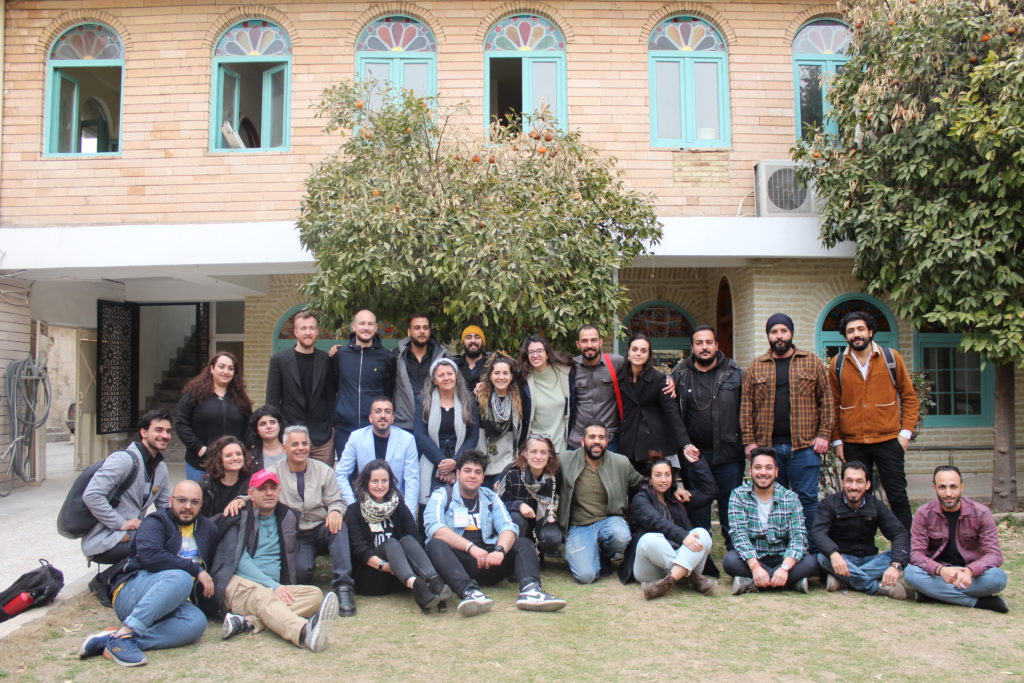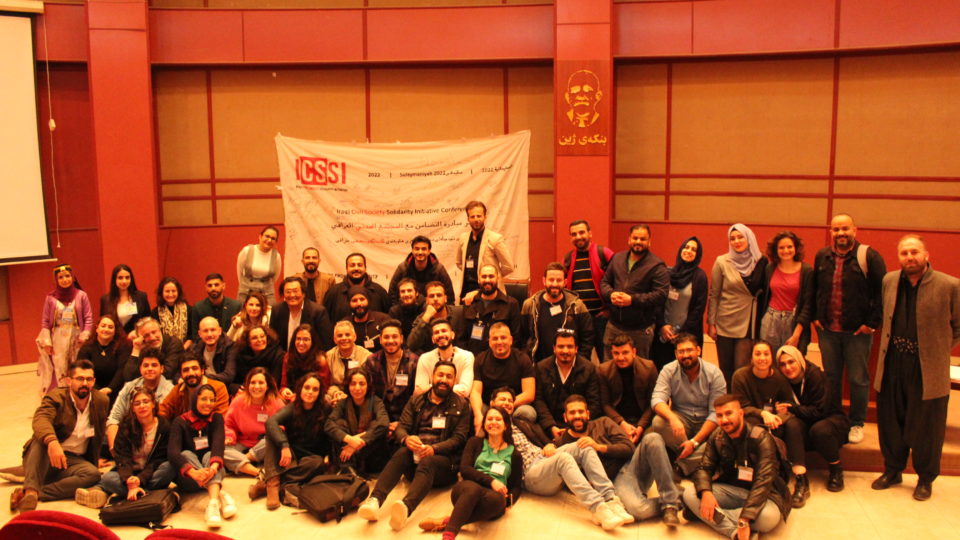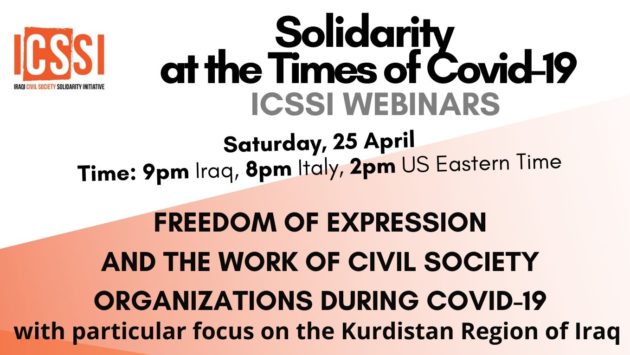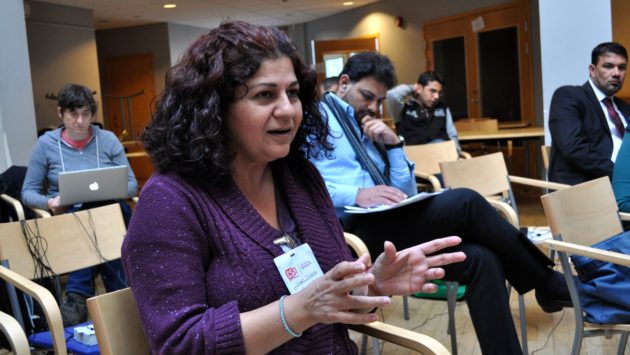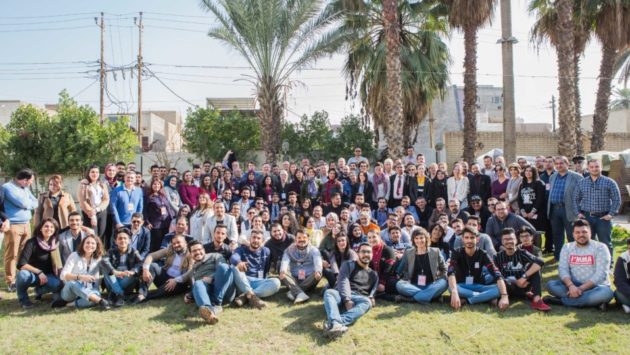STARTING OVER FROM SOLIDARITY
Final Declaration of ICSSI 2022 Conference
Sulaymaniyah, 11th-16th March 2022
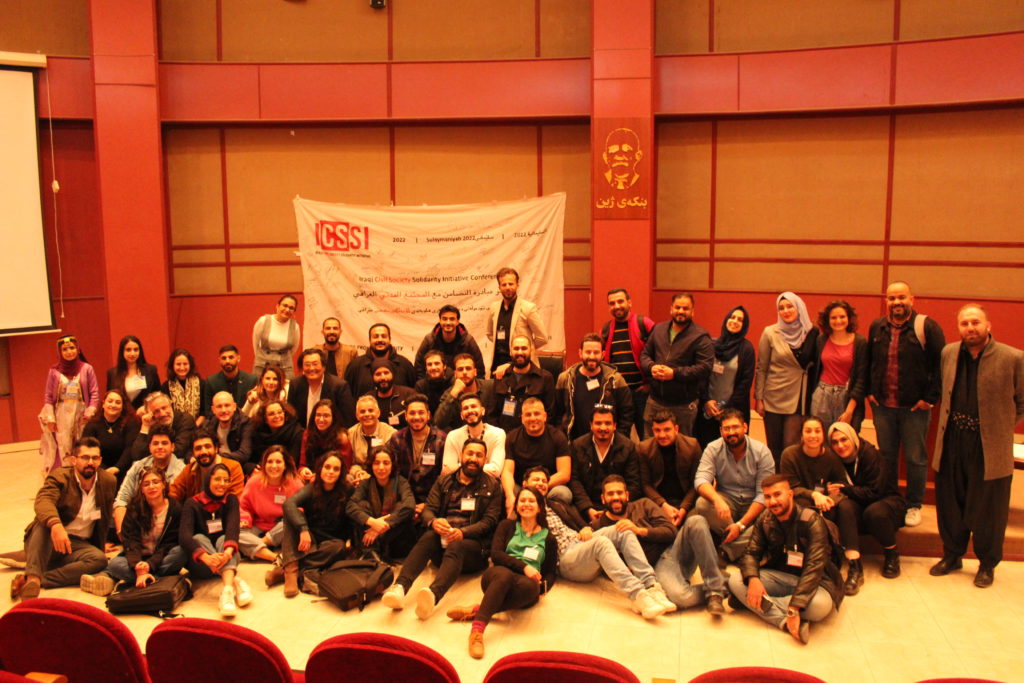
Introduction
ICSSI held its 11th international conference in Sulaymaniyah from 11th to 13th March 2022. Civil society activists from all over Iraq and from abroad gathered in Iraqi Kurdistan for a three-day conference to discuss the current situation within Iraqi civil society. Three years have passed since our last gathering in Baghdad, when ICSSI’s 10th anniversary was celebrated. Since 2019, events, both in Iraq and internationally, prevented us from meeting regularly. This year’s conference therefore represented a unique occasion to reconnect and strengthen our solidarity.
Solidarity, we believe, is the only answer to the appalling violence currently raging in Ukraine. We stand in solidarity with all the people who bravely struggle for peace within a context of increasing polarization, be they activists, journalists or human rights defenders in both Ukraine and Russia.
The last couple of years have been significant for Iraqi society and history. From the widespread participation in the October uprisings to the social and economic effects of the Covid-19 pandemic, through the limitations imposed to freedom of expression and freedom of the press all over the country and the brutal violence used against demonstrators and human rights defenders, it is undeniable that the situation in Iraq presents many challenges. However, today Iraqi civil society sees — and is seizing — many opportunities.
Representatives of 27 civil society organizations – both Iraqi and international – took part in the conference, ensuring a diverse range of perspectives on a set of topics. Members of local forums, as well as the Iraqi and Kurdistan social forum, ensured a focus on those issues which are most relevant at a local and grassroots level.
The agenda of the conference mirrored the work done over the last couple of years and came through consultation with the Iraqi social forum. The first day of conference was entirely devoted to the Kurdistan, Iraqi and local social forums, highlighting civil society’s methods of working collectively. During the second and third days, plenary sessions and working groups focused on 4 general topics:
civil society and democracy – freedom of expression and freedom of the press, the shrinking spaces for civil society, post-election scenarios and women’s political participation;
nonviolence, peacebuilding and protection of human rights defenders – prevention of violent extremism and the domestic violence law, the living conditions of human rights defenders in Iraq;
education and social, economic and cultural rights – the right to education, workers’ rights and the experience of social entrepreneurship – environment and cultural heritage – protection of Iraqi cultural heritage, climate change and water management.
The days in Sulaymaniyah were days of intense work and animated discussion. The conference enabled us all to reflect more deeply on the challenges faced by Iraqi civil society — as well as those facing international civil society — and revealed the urgent need to strengthen the solidarity among all of us who are working at the local level to bring about more justice and peace. This was possible thanks to the active participation of all the attendees to the different sessions, but also thanks to a number of people who supported the conference organizing. We would like to thank all those who participated with us in this important event, all volunteers for their valuable support, the interpreters for their patience and commitment, CCFD – Terre Solidaire for their constant support, the organizations and individuals who donated time and energy to make this event happen, and finally, the ICSSI team for their tireless efforts devoted to making this conference a reality.
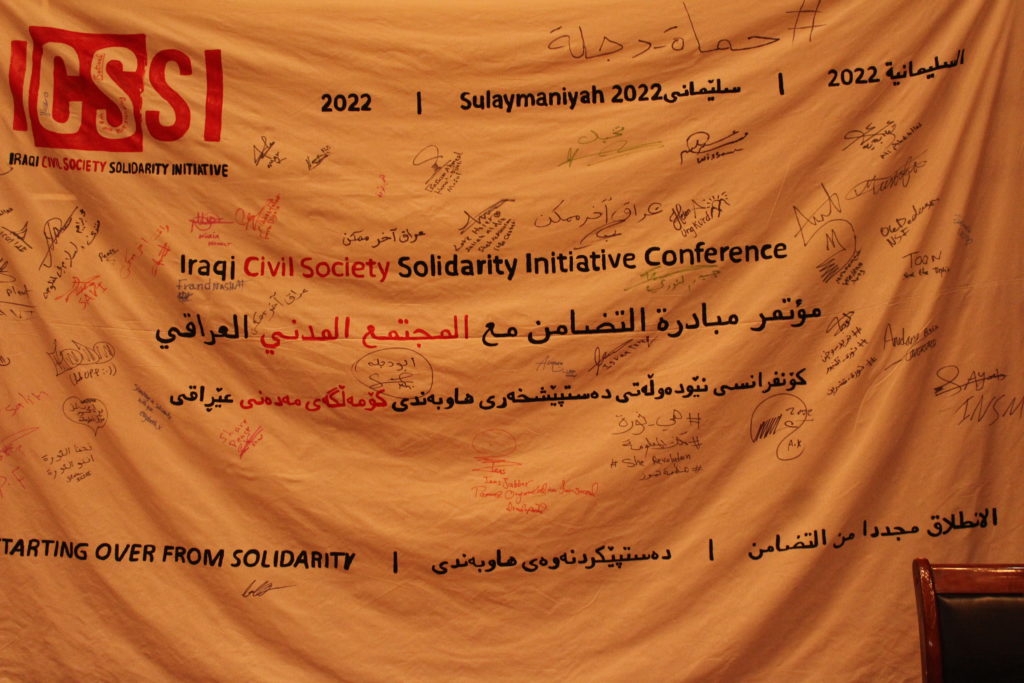
The following are some key recommendations generated by the working groups during the 2nd and 3rd days of the conference, the results of various campaigns’ coordination and meetings of the General Assembly.
(2nd and 3rd day) Iraqi civil society Recommendations
CIVIL SOCIETY AND DEMOCRACY
Freedom of Expression and Freedom of the Press
- Increase the attention to and work on the issue of cybersecurity for Iraqi activists, journalists and civil society organizations.
- Enhance coordination and share knowledge of Iraqi CS with international experts on cases of violations of freedom of expression and the press in Iraq and on existing best practices and examples of successful advocacy.
- Create links between Iraqi and international independent journalists.
- Update and fill the gaps in the existing, obsolete, Iraqi law framework (3025) on freedom of expression and the press, the Iraqi penalty law (1969) on the protection of journalists, publication of crimes and the project of the media and communications authority.
- Amplify the relevance of and give special protection to women’s voices.
- Work on making new journalists believe in an independent press and freedom of expression.
- Observe and follow up on court trials against Iraqi activists and journalists.
Post-elections and the future of October Uprisings
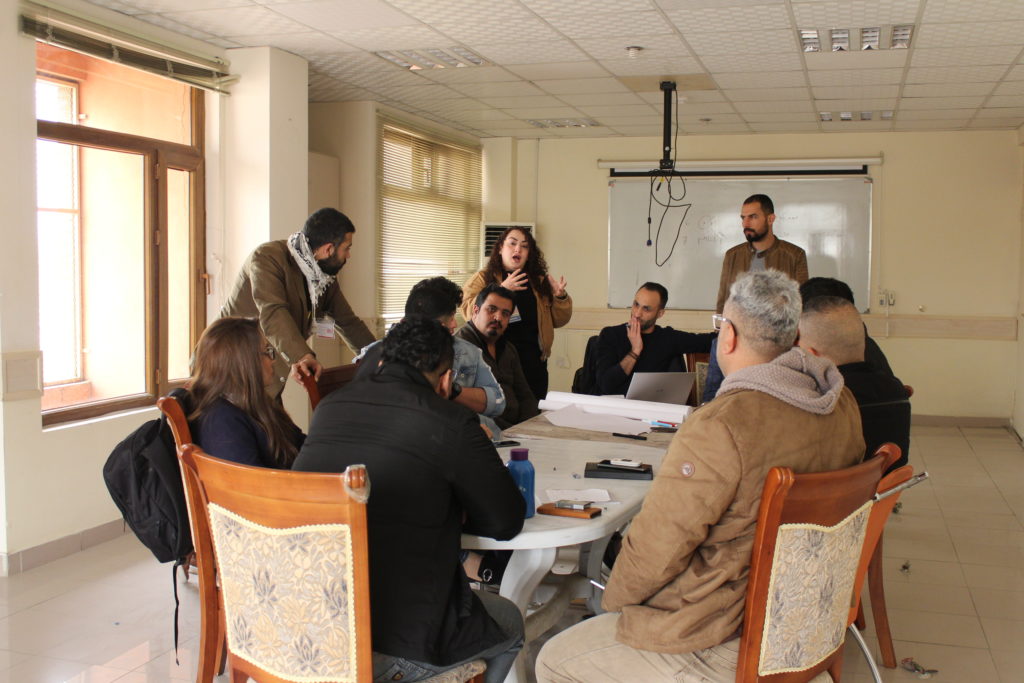
- Recognize the significance of the demonstrations held between 2003 and 2019, their role in calling for a common Iraqi identity and against divisive rhetoric.
- Recognize that the protest’s requests were not satisfied by any subsequent government, all of which were created to act on narrow partisan interests distant from those of the Iraqi people.
- Reflect on the fact that the call for early elections has been co-opted by the government.
- Realize key mistakes such as the attempt to separate advocacy from politics which has weakened the the possibility of effective civic action rising from Tishreen.
Shrinking spaces for Civil Society
Because work spaces for Iraqi civil society are rapidly shrinking, there is now a real threat to basic freedoms and sustainable democracy in Iraq. In response, ICSSI will establish a permanent working group to address the following:
- Reviewing the legal framework for civil society organizations in Iraq and current administrative procedures constituting an obstacle to their freedom and security.
- Collaborating with other NGOs to ensure that Iraq is fulfilling International Standards on issues pertaining to civil society.
Women’s Political Participation
- Promote a robust and active definition of women’s political participation; it is insufficient for women merely to be a “presence” (quotas), but they must be an effective part of the decision-making process in every aspect of social and political life.
- Work on the Iraqi National Action Plan on women and expand existing resources for enhancing women’s participation.
- Share knowledge and explore innovative and contemporary methods for women’s involvement, recognizing the importance of working on the social and cultural dimensions for promoting their political empowerment.
- Include the issue of women’s role and participation in society within education programs.
- Promote a new conception of feminism as inclusive of men’s participation and not against cultural traditions and dignity, countering the stigmatization of the feminist movement in Iraq.
NONVIOLENCE, PEACEBUILDING, AND HUMAN RIGHTS DEFENDERS
Prevention of Violent Extremism (PVE)
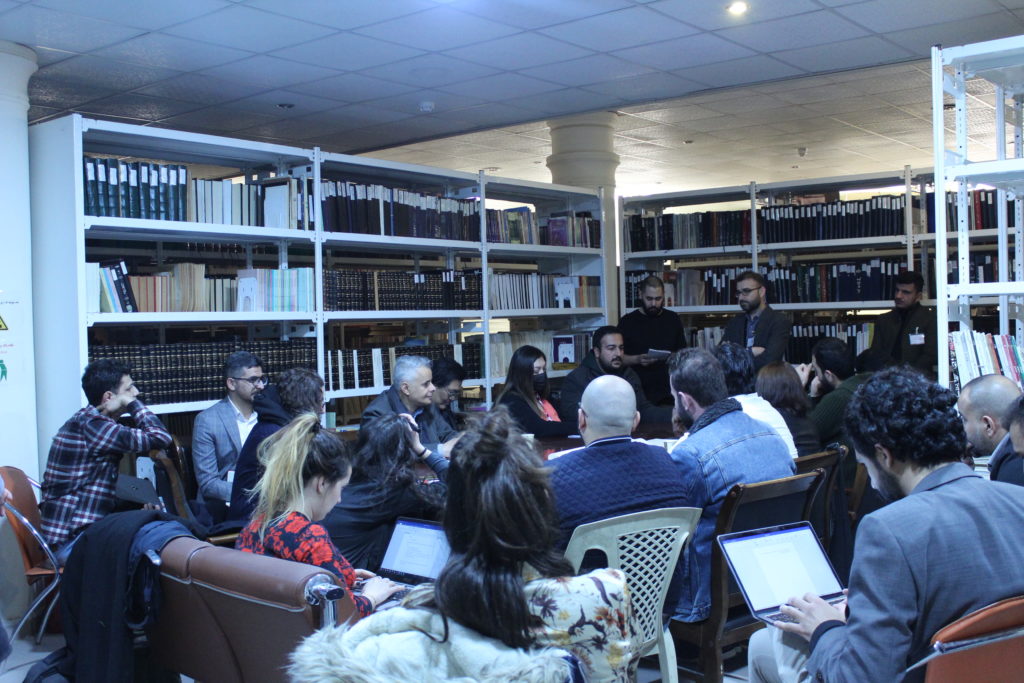
- Restore Iraqi and KRI platforms for PVE’s coordination for pursuing a common strategy and deepening knowledge of available tools and research in the sector.
- Create contacts between Iraqi and International Civil Society experts and organizations working on PVE, enhance Iraqi civil society work on PVE by sharing experiences and lessons learned internationally.
- Establish consistent and thorough follow ups after training activities on PVE to ensure and verify their effective and long-term results.
- Engage with Iraqi youth who left school; develop innovative ways to reach those in a condition of social exclusion, encouraging them to become actively involved and trained in peacebuilding and issues surrounding human rights and nonviolence.
- Recognize the importance of political advocacy for people’s needs and social inclusion for achieving effective PVE.
- Provide support to the Iraqi activists who have been targeted and abused because they participated in protests; work for human rights and political change as a way to prevent their radicalization.
- Counter political manipulation of PVE, alerting international and Iraqi institutions on the risks of its misuse in human rights activist’s criminalization and persecution.
Countering Domestic Violence
- Enhance the ongoing campaign to promote the Law Against Domestic Violence in Iraq by preparing and disseminating a clear and easily understandable draft of the law; tackle the issue of opposition against women shelters; strengthen networks and mobilize people so that it will be passed in the Iraqi Parliament.
- Invest in the potential of women’s activists which was made clear during October’s Uprisings.
- Innovate existing methods for advocating for women’s rights.
Human Rights Defenders
- Establish stable collaboration with the High Commission for Human Rights in Iraq (HC) thus expanding their knowledge and understanding of the importance of the Human Rights Defenders issue, especially in Iraq.
- Invite European and UN bodies (including the Special Rapporteur on Human Rights Defenders) to Iraq; call on the Iraqi Government to recognize the role and conditions of Iraqi Human Rights Defender’s; set up and implement a legal framework for their protection.
- Enhance and coordinate monitoring efforts on the cases of violation and abuse against Iraqi Human Rights Defenders in each governorate of Iraq.
- Support the Protect Iraqi Human Rights Defenders NOW! Campaign and its connections at the local and international level.
EDUCATION AND ECONOMIC, SOCIAL AND CULTURAL RIGHTS
Worker’s rights and Economic Policies
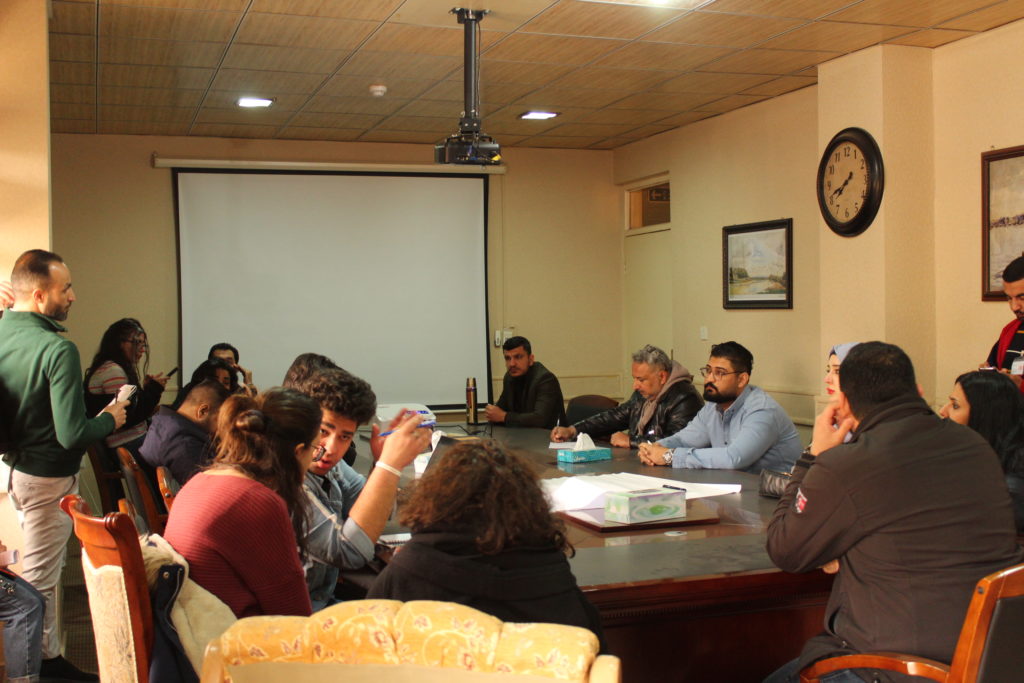
- Prevent the privatization of essential services; promote and defend the de-privatization of basic services, such as education, housing, and health.
- Support the goals of workers’ syndicates’ and their capacity-building.
- Support the requests of workers’ syndicates’ by ensuring the diversity of their work and the freedom to create syndicates in all sectors, whether public, private or common.
- Promote the enforcement of Iraqi laws on labor rights, social security, anti-corruption, and transparency.
Right to Education
- Support Iraqi Social Forum Education Path; working on alternative budgeting to develop and promote new policies for the education sector in Iraq.
- Use litigation as a tool for fighting corrupt systems impacting the enforcement of the right to education.
- Lobby to reform the regulation 5/2013 into law for private education.
- Involve teachers and students in the decision-making process relating to education in Iraq.
Social Enterprise
- Promote an economy which cultivates and supports social solidarity and social enterprise in order to create and maintain economic activity within civil society.
- Prepare and disseminate a model of how social enterprises work; ensure that this knowledge is readily available to Iraqi civil society and youth; verify the existing conditions for the establishment of new social enterprises/businesses within the Iraqi context.
- Identify and share sources of funds for social enterprises in Iraq and internationally (e.g., grant opportunities).
- Create opportunities for exchanges of practices of international and Iraqi social enterprises, especially those currently working in Iraq.
- Seek opportunities to establish spaces where business ideas can be considered and created; support systems for the establishment of new social enterprises.
- Encourage start-ups and micro-businesses which might then become thriving social enterprises that contribute to the well-being of local communities and have a broader positive impact on society.
- Call on authorities to improving and adapt the legal framework for social enterprises.
ENVIRONMENT AND CULTURAL HERITAGE
Climate change and global warming
- Reflect critically on current production and consumption models; explore available alternatives for systemic transformation.
- Find and secure support from international actors to pursue violations against environmental and human rights by oil companies, which is urgent given the high risk of confronting in-country actors.
- Advocate for a stronger legal framework for oil companies and for increasing the use of clean and renewable energy sources.
- Engage students and teachers in creating learning opportunities about the impact of climate change and the need for alternative systems.
- Ensure the follow-up on environment-related and relevant government policies and reports.
- Amplify the voices of Iraqis affected and displaced by climate change on their local communities.
- Analyze Iraq’s Annual Budget, study its environmental impact and advocate for allocating money to combat climate change and develop climate adaptation strategies.
- Engage and empower the Iraqi Ministry of Environment to follow up on recommendations and environmental campaigns objectives from Iraqi civil society.
Environmental protection and water management
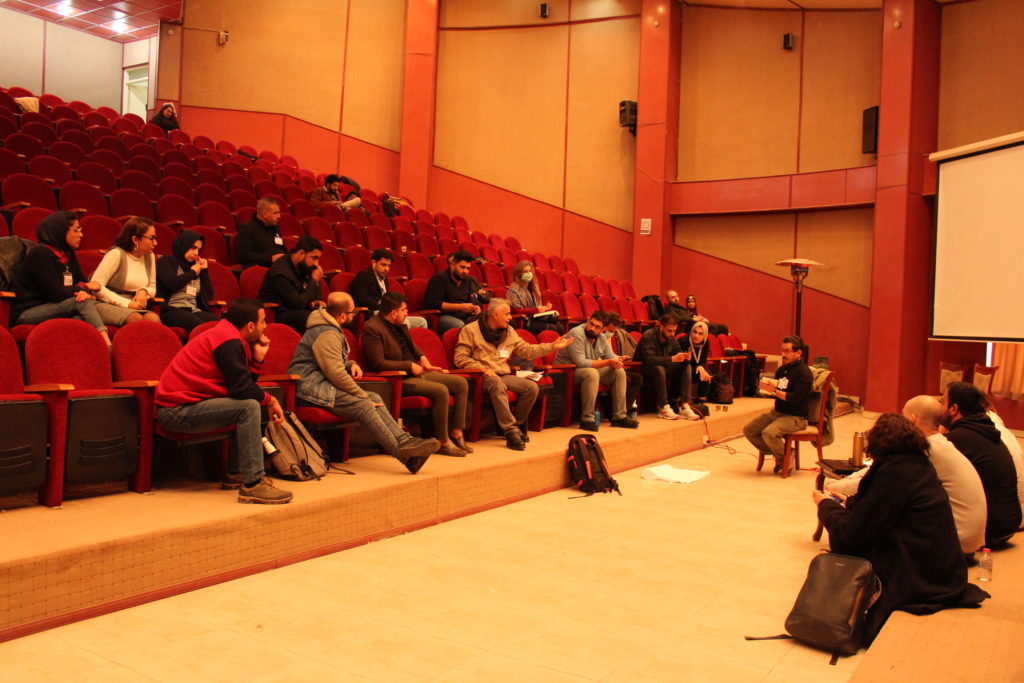
- Promote and increase the activity of the Iraqi Social Forum Environment Path, setting its priorities.
- Enhance networking with new voluntary teams and environmental initiatives occurring in Iraq.
- Develop new environmental teams by providing specialized training.
- Create more links with International environmental movements.
- Promote internal environmental policies to be applied by Iraqi and international civil society organizations and groups operating in Iraq.
- Hold the international community responsible for the environmental impacts of companies’ activity in Iraq, with a special focus on the challenges posed by oil and water infrastructure (dams) companies.
- Promote Iraqi civil society participation in all forums and opportunities for networking with environmental movements (including the Norwegian Social Forum in October 2022).
- Keep the focus on Sustainable Development Goals while developing civil society action for the environment.
- Build the Iraqi civil society capacity to collect documentation, analyze data and impacts on the environment in a professional way.
- Promote activity by Iraqi civil society in, and knowledge of, the Business and Human Rights sector to enhance their work for companies’ accountability.
Cultural Heritage
- Advocate for the protection of cultural and natural heritage in Iraq, particularly using art in all its forms.
- Pressure all sources of financial support to invest in the protection of Iraq’s natural and cultural heritage, giving proper financial support to those colleges and institutions specialized in the sector.
- Promote the standards of eco-responsible tourism.
(4th day) Campaigns’ coordination
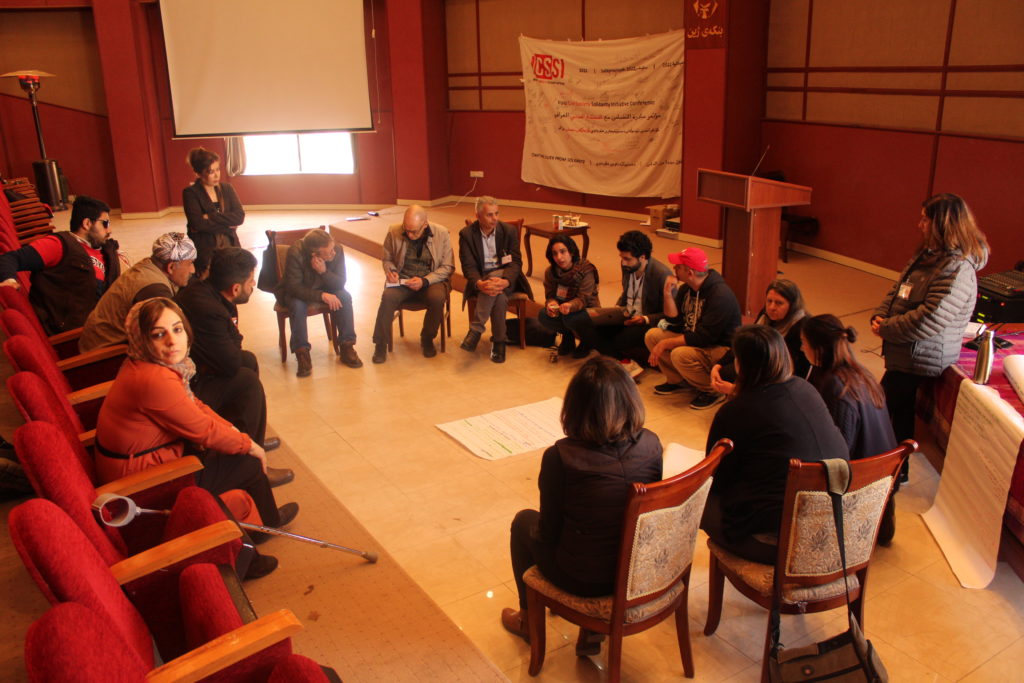
On the 15th of March, a working group on women’s rights and the three main ICSSI campaigns: Save the Tigris, End Cross-Border Bombings and Protect Iraqi Human Rights Defenders NOW! collaborated to achieve the following:
- Establishment of internal strategic meetings to enhancing their networking and strategy-building thanks to focused face-by-face dialogue.
- Identification of specific mutual goals based on cross-campaign coordination, for instance, End Cross Border Bombings and Save the Tigris Campaigns stated their mutual interest in working together on the environmental impact of the ongoing bombings in northern Iraqi Kurdistan, while the members of Protect Iraqi Human Rights Defenders NOW Campaign restated their shared engagement in protecting and supporting Women Human Rights Defenders. Adidtionally, the Environmental Defenders connected with Save The Tigris to build a common team of lawyers to advocate for the protection of Iraqi activists.
(5th day) ICSSI GENERAL ASSEMBLY
Introduction
The ICSSI General Assembly is a space dedicated to the internal review of ICSSI working strategies and structure.
On the 16th of March, approximately 20 representatives from some of the main partners of ICSSI attended the General Assembly session, sharing their perspectives on how to improve the work of ICSSI supporting Iraqi civil society. The ICSSI Coordinators presented the results of the Strategic Review, which was carried out by the ICSSI Secretariat from 2020 to the end of 2021 to reflect accurately the work done inside the ICSSI and to identify principles, rules, and means to improve its internal processes and work.
Results
- The Participatory Democracy system and system of taking decisions by positive consent has been reviewed and agreed on in a special document.
- The new Mission Statement has been collectively reviewed and finally approved, together with the ICSSI Consensus Charter.
The ICSSI Mission Statement states ICSSI’s identity, aim, history, values, principles, and core thematic issues of its work.
The ICSSI Consensus Charter, explains how to put into practice the principle of participatory democracy within the ICSSI decision-making processes following the consensus methodology, enhancing collective and inclusive decisions.
- The new ICSSI Internal Regulations have been collectively reviewed and approved.
The ICSSI Internal Regulations establish the internal structure of ICSSI, its primary decision-making bodies, how to regulate its staff, volunteers, coordinating NGO, partnerships, and campaigning processes.
- The ICSSI Assembly of Members has been constituted, collecting members’ willingness to become part of it and their representative’s participation.
The ICSSI Assembly of Members is the new political body of the ICSSI, in charge of guiding its activities and supervising its coherence with ICSSI values and principles as stated in the Mission Statement, and the effective implementation of the ICSSI Strategy as established by the ICSSI Conference.
- The ICSSI Secretariat – the implementation body of the ICSSI- has been dissolved and renewed with the participation of new members.
The old co-coordinators have resigned, giving space to intergenerational change: Silvia Abbà has been nominated as the new International Coordinator, while a selection process has been opened to collecting candidacies for the Iraqi Coordinator position.
